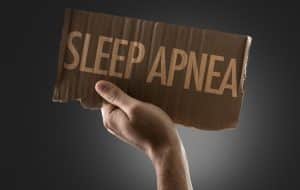When Should I Get A Test for Sleep Apnea?

What is Sleep Apnea?
Sleep apnea is a sleep disorder characterized by a disruption in the regular flow of breathing. Those with the condition abruptly stop and restart breathing many times throughout the night, hindering the body’s ability to reach a deep, restorative sleep, which is vital to feeling adequately rested.
There are two main types of sleep apnea:
- Obstructive sleep apnea – the most prevalent form of the disorder, it occurs due to anatomical structures or muscles blocking airflow during sleep.
- Central sleep apnea – this less common form occurs when the brain fails to send signals to the muscles to prompt breathing.
What are the Symptoms of Sleep Apnea?
Common symptoms associated with sleep apnea include:
- Excessively loud or chronic snoring
- Periods of not breathing during sleep
- Waking with a sore throat or dry mouth
- Sudden awakening with shortness of breath
- Headaches
- Extreme daytime fatigue
- Inability to concentrate
- Irritability
If you notice that you suffer from several of these symptoms, see a specialist who can test you for sleep apnea and set you on the path to getting a good night’s sleep.
How is Sleep Apnea Diagnosed?
A sleep apnea diagnosis typically begins with an in-office consultation, where you will describe your symptoms to the doctor and answer some questions about your sleep habits. In order to confirm a suspected sleep apnea diagnosis and to determine the severity of the condition, a sleep study is often recommended. A sleep study may be performed at home using a special device provided by your doctor, or at a sleep lab, depending on what your medical provider recommends.
What are the Treatment Options for Sleep Apnea?
There are a variety of treatment options for patients with sleep apnea. Continuous positive airway pressure (CPAP) is the most commonly prescribed treatment for this condition. It involves a patient wearing a mask that delivers a steady stream of air into the airways, preventing those passageways from closing during sleep.
Additionally, there are several CPAP alternatives that can help control the sleep disorder, including:
- Oral appliances – these devices are designed to help your throat stay open during sleep. Some oral appliances bring your jaw forward to alleviate snoring, while others re-position the tongue to prevent it from blocking airways.
- Surgery – if oral appliances or CPAP don’t work for you, surgical options may be another treatment path to consider. Surgery may involve removing excess tissue at the back of the throat or addressing anatomical structures that are causing airway blockage, such as the adenoids, tonsils or nasal polyps.
In addition, lifestyle changes that may help alleviate sleep apnea symptoms include:
- Losing weight
- Quitting smoking
- Avoiding alcohol
- Avoiding sleeping pills
- Sleeping on your side or stomach
If you believe you may have sleep apnea, contact eos dental sleep today. We specialize in the treatment of snoring and sleep apnea using oral appliance therapy and strive to help our patients get a good night’s sleep.
